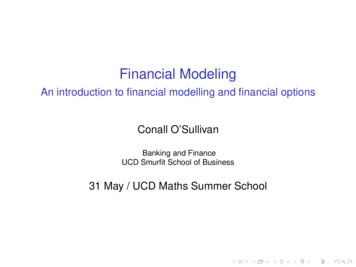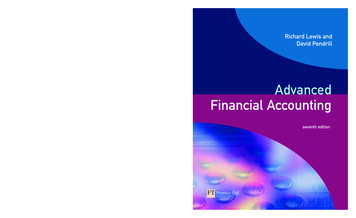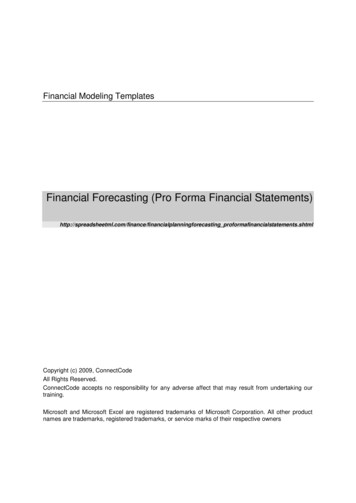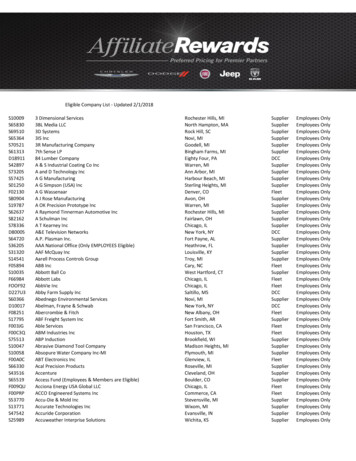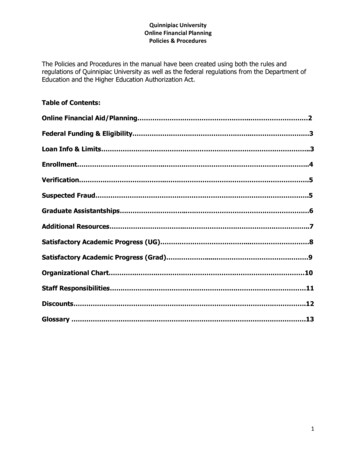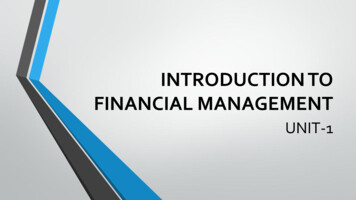
Transcription
The Perimeter Guidance ManualChapter 16Scope of the AlternativeInvestment Fund ManagersRegime
PERG 16 : Scope of theAlternative Investment FundManagers Regime16.1GSection 16.1 : IntroductionIntroductionQuestion 1.1: What is the purpose of the questions and answers in thischapter?The purpose is to consider the scope of regulated activities specificallyrelating to the Alternative Investment Fund Managers Directive 2011/61/EU("AIFMD") as it was implemented in the UK through the RAO. The AIFMDregime in the United Kingdom is based on the AIFMD and the AIFMD level 2regulation as well as other UK legislation, including the AIFMD UKregulation.Question 1.2: What are the regulated activities specifically relating toAIFMD?The regulated activities that specifically relate to the AIFMD regime in theUnited Kingdom are:(1) managing an AIF (see PERG 16.3); and(2) acting as a depositary of an AIF (see PERG 16.4).Question 1.3: What are the main measures dealing with the scope?They are the UK provisions which implemented the AIFMD, which include:(1) the AIFMD level 2 regulation(2) the ESMA document "Guidelines on key concepts of the AIFMD" (ESMA/2013/611); and(3)the AIFMD UK regulation which largely implemented the AIFMD in theUK.Question 1.4: What is the approach to deciding whether something iscovered by the AIFMD?16When defining what an AIF is, the drafters of AIFMD faced a dilemma. Ifthere is a precise and detailed definition there is a risk that some funds thatshould be regulated would fall outside regulation, given the wide variety oflegal forms they can take. However, a broad definition entails a risk thatAIFMD is given a much wider scope than intended. The agreed definition ofAIF is drafted at a high level of generality and uses words which have a widemeaning. So we have approached PERG 16 by looking at what sorts ofentities are clearly meant to be caught and then using that as a guide toidentify cases which are not fairly within the definition, to avoid aninterpretation that would give an exorbitantly wide scope. In the same way,descriptions of what is excluded should not be read in a way that would takecases out of scope that are fairly within it.PERG 16/2www.handbook.fca.org.uk Release 17 Mar 2022
PERG 16 : Scope of theAlternative Investment FundManagers RegimeSection 16.1 : IntroductionA number of answers in PERG 16 take a broad purposive interpretation andlook at economic substance. The definition of AIF is drafted at a high levelwithout much detail and uses broad concepts rather than precise technical orlegal ones, meaning that PERG 16 takes a similar approach to interpretingit.Question 1.5: Are there transitional arrangements?Yes. Some of the transitional arrangements for implementing the AIFMDmay affect the date by which a person who would otherwise be managingan AIF or acting as a depositary of an AIF needs permission to do so. PERG 16 does not deal with these arrangements. Details are in Part 9 of theAIFMD UK Regulation.16 Release 17 Mar 2022www.handbook.fca.org.ukPERG 16/3
PERG 16 : Scope of theAlternative Investment FundManagers Regime16.2GSection 16.2 : What types of funds andbusinesses are caught?What types of funds andbusinesses are caught?Question 2.1: What is the basic definition of an AIF?For the purposes of the AIFMD regime in the United Kingdom, an AIF is acollective investment undertaking, including investment compartments ofsuch an undertaking, which:(1) raises capital from a number of investors, with a view to investing it inaccordance with a defined investment policy for the benefit of thoseinvestors; and(2) is not a UK UCITS.The key elements of the definition are:(3) it is a collective investment undertaking (CIU);(4) it has a defined investment policy;(5) it raises capital with a view to investing that capital for the benefit ofthose investors in accordance with that policy;(6) an AIF does not include a UK UCITS.It is necessary to satisfy all the elements of the definition in order to be anAIF.Question 2.2: Does an AIF have to take any particular legal form?No. An AIF may be open-ended or close-ended. It may or may not be listed. It does not matter whether it is set up under contract, trust or statute or ifit takes another type of legal form. It does not matter what kind of legalstructure it has.16 A limited partnership, a limited liability partnership, a limited liabilitycompany, an ordinary partnership, a unit trust, an ICVC and a contractualscheme could all be covered. It does not matter where the AIF is formed. It may be formed under thelaws of the United Kingdom or any other country.Question 2.3: What is an undertaking for these purposes?PERG 16/4www.handbook.fca.org.uk Release 17 Mar 2022
PERG 16 : Scope of theAlternative Investment FundManagers RegimeSection 16.2 : What types of funds andbusinesses are caught?It covers a wide range of entities and goes beyond the Glossary definition ofundertaking. It will include a body corporate, a partnership, anunincorporated association and a fund set up as a trust.Question 2.4: Is an AIF the same as a collective investment scheme?No, although the two concepts overlap considerably.Question 2.5: Is an undertaking excluded because it has no externalmanager?No. An undertaking that has no external manager and is managed by itsown governing body may be an AIF.Question 2.6: Is the definition restricted to funds that invest in certain kindsof asset?No. Assets can include traditional financial assets (equity, equity related anddebt), private equity, real estate and also non-traditional asset classes such asships, forests, wine, and any combination of these assets. These are justexamples; assets can include assets of any kind or combinations.Question 2.7: Does the definition depend on how the underlying property isheld?No. The investors may receive a beneficial interest in the underlyingproperty, as might be the case in a trust structure. They may also receive nointerest in the underlying property but, instead, their interest may berepresented by shares or units in the AIF, as would be the case where the AIFtakes the form of a company limited by shares. It might even be possible forthe investors to own the assets jointly.Question 2.8: Must the scheme be time-limited or designed to allowinvestors to exit from time to time or at a particular time?A scheme may be an AIF even if there are no arrangements for units orshares to be repurchased, redeemed or cancelled. Likewise a scheme may bean AIF even if it does not have a finite life.Question 2.9: Is a business excluded because it is exclusively or largelyfunded by debt or other types of leverage rather than equity capital?No. See the answers to Questions 2.37 (Is a securitisation vehicle covered?)and 2.44 (Can an issue of debt securities be an AIF?).Key elements of the definition16Capital-raisingQuestion 2.10: You say that an undertaking needs to raise capital to be anAIF. What does capital raising involve?Under the ESMA AIFMD key concepts guidelines, the commercial activity byan undertaking or a person (or entity acting on its behalf - typically, theAIFM) of taking direct or indirect steps to procure the transfer orcommitment of capital by one or more investors to the undertaking for thepurpose of investing it in accordance with a defined investment policy,should amount to the activity of raising capital. Release 17 Mar 2022www.handbook.fca.org.ukPERG 16/5
PERG 16 : Scope of theAlternative Investment FundManagers RegimeSection 16.2 : What types of funds andbusinesses are caught?It is immaterial whether:(1) the activity takes place once, on several occasions or on an ongoing basis;(2) the transfer or commitment of capital is in the form of subscriptions incash or in kind.If the capital raising is complete before the regulated activities of managingan AIF and acting as a depositary of an AIF come into force, the undertakingmay still be an AIF, although transitional arrangements may apply (see Part 9of the AIFMD UK Regulation).An undertaking which makes investments will not be an AIF if thoseinvestments are funded by the undertaking other than by raising capital inaccordance with the definition of an AIF. The fact that the undertaking'sshares can be bought and sold on a stock exchange is not, of itself, theraising of capital by the undertaking.Question 2.11: Is a fund that only allows a single investor caught?Under the ESMA AIFMD key concepts guidelines, an undertaking which isnot prevented by its national law, the rules or instruments of incorporation,or any other provision or arrangement of binding legal effect, from raisingcapital from more than one investor should be regarded as an undertakingwhich raises capital from a number of investors. This is the case even if it hasonly one investor.A limited partnership in which there is a single limited partner making asubstantive contribution and a general partner making a nominal 1contribution will not be an AIF (subject to the answer to Question 2.12 (Is afund that only allows a single investor always outside the definition of anAIF?)) as the undertaking will only have raised capital from one investor. The 1 contribution should be ignored for this purpose as it is wholly nominal.Question 2.12: Is a fund that only allows a single investor always outsidethe definition of an AIF?No. Under the ESMA AIFMD key concepts guidelines, an undertaking whichis prevented by its national law, the rules or instruments of incorporation, orany other provision or arrangement of binding legal effect, from raisingcapital from more than one investor should be regarded as an undertakingwhich raises capital from a number of investors if the sole investor:(1) invests capital which it has raised from more than one legal or naturalperson with a view to investing it for the benefit of those persons; and(2) consists of an arrangement or structure which in total has more than oneinvestor for the purposes of UK provisions which implemented the AIFMD.16Examples of arrangements or structures of this type include:(3) master / feeder structures where a single feeder fund invests in a masterundertaking;(4) fund of funds structures where the fund of funds is the sole investor inthe underlying undertaking; and(5) arrangements where the sole investor is a nominee acting as agent formore than one investor and aggregating their interests for administrativepurposes.PERG 16/6www.handbook.fca.org.uk Release 17 Mar 2022
PERG 16 : Scope of theAlternative Investment FundManagers RegimeSection 16.2 : What types of funds andbusinesses are caught?Defined investment policyQuestion 2.13: What indicative criteria could be taken into account indetermining whether or not an undertaking has a defined investmentpolicy?Under the ESMA AIFMD key concepts guidelines, an undertaking which has apolicy about how the pooled capital in the undertaking is to be managed togenerate a pooled return (see the answer to Question 2.16 for what pooledreturn means) for the investors from whom it has been raised should beconsidered to have a defined investment policy. The following factors would,singly or cumulatively, tend to indicate the existence of such a policy.(1) Whether the investment policy is determined and fixed, at the latest bythe time that investors' commitments to the undertaking become binding.(2) Whether the investment policy is in a document which becomes part of,or is referenced in, the rules or instruments of incorporation of theundertaking.(3) Whether the undertaking, or the legal person managing the undertaking,has an obligation (however arising) to investors, which is legally enforceableby them, to follow the investment policy, including all changes to it.(4) Whether the investment policy specifies investment guidelines, withreference to criteria including any or all of the following:(a) to invest in certain categories of asset, or conform to restrictions on assetallocation; or(b) to pursue certain strategies; or(c) to invest in particular geographical regions; or(d) to conform to restrictions on leverage; or(e) to conform to minimum holding periods; or(f) to conform to other restrictions designed to provide risk diversification.For the purposes of (4), any guidelines for the management of anundertaking that determine investment criteria, other than those in thebusiness strategy followed by an undertaking having a general commercialor industrial purpose, should be regarded as investment guidelines. See theanswer to Question 2.18 (Is an ordinary commercial business a collectiveinvestment undertaking?) for what an undertaking having a generalcommercial or industrial purpose means.Following the approach in the ESMA AIFMD key concepts guidelines, leavingfull discretion to make investment decisions to the legal person managing anundertaking should not be used to circumvent the UK provisions thatimplemented AIFMD. Part of the definition of an AIF is that there should bea defined investment policy. It is our view that this guidance is aimed atarrangements that whilst in form do not meet the definition, may in practicedo so. For example, say that the manager has a legal discretion that is toowide to meet the definition of a defined investment policy but publishes adetailed investment policy (which is not legally binding) and leads theinvestors to expect that it will follow it. Under the approach in ESMA AIFMDkey concepts guidelines that fund may still be an AIF.Collective investment undertaking Release 17 Mar 2022www.handbook.fca.org.ukPERG 16/716
PERG 16 : Scope of theAlternative Investment FundManagers RegimeSection 16.2 : What types of funds andbusinesses are caught?Question 2.14: What is a collective investment undertaking?See Questions 2.15 to 2.25.It is important to remember that even if a business is a CIU that does notnecessarily mean it is an AIF. To be an AIF it must meet all the criteria set outin the answer to Question 2.1 (What is the basic definition of an AIF?).Question 2.15: What is the basic definition of a collective investmentundertaking?Under to the ESMA AIFMD key concepts guidelines, the followingcharacteristics, if all of them are exhibited by an undertaking, should showthat the undertaking is a CIU:(1) the undertaking does not have a general commercial or industrialpurpose (please see the answer to Question 2.18 (Is an ordinary commercialbusiness a collective investment undertaking?) to see what this means);(2) it pools together capital raised from its investors for the purpose ofinvestment with a view to generating a pooled return for those investorsfrom investments; and(3) the Unitholders or shareholders of the undertaking - as a collective group- have no day-to-day discretion or control.For (3), the fact that one or more, but not all, of the Unitholders orshareholders are granted day-to-day discretion or control should not betaken to show that the undertaking is not a CIU.Question 2.16: What is a pooled return for these purposes?Under the ESMA AIFMD key concepts guidelines, it is the return generatedby the pooled risk arising from acquiring, holding or selling investmentassets - including activities to optimise or increase the value of these assets irrespective of whether different returns to investors, such as a tailoreddividend policy, are generated.Question 2.17: The answer to Question 2.15 refers to day-to-day control. Is itnecessary to show day-to-day control to show that there is no AIF?No. This is explained further in the answer to Question 2.47 (What factorsare relevant to whether a joint venture is excluded on the basis that it ismanaged by its members?).Question 2.18: Is an ordinary commercial business a collective investmentundertaking?16No. An undertaking with a general commercial or industrial purpose is not aCIU. The primary purpose of a CIU is investment to generate a pooled return.This is in contrast to an ordinary commercial business of manufacturing,production, trading or the supply of services. Hence a supermarket,professional services firm or manufacturer is not generally a CIU or an AIF.However, distinctions between "investment" and "trading" for tax purposesare not determinative here.A general commercial or industrial purpose is defined in the ESMA AIFMDkey concepts guidelines as the purpose of pursuing a business strategy whichincludes characteristics such as running predominantly:PERG 16/8www.handbook.fca.org.uk Release 17 Mar 2022
PERG 16 : Scope of theAlternative Investment FundManagers RegimeSection 16.2 : What types of funds andbusinesses are caught?(1) a commercial activity, involving the purchase, sale, and/or exchange ofgoods or commodities and/or the supply of non-financial services; or(2) an industrial activity, involving the production of goods or construction ofproperties; or(3) a combination thereof.Question 2.19: Does that mean that if my undertaking deals in non-financialassets it can't be a CIU?Not necessarily. As explained in the answer to Question 2.6 (Is the definitionrestricted to funds that invest in certain kinds of asset?), an AIF may invest innon-financial assets. In deciding whether an undertaking is for generalcommercial or industrial purposes you must look at all relevant factors. Otherexamples include:(1) whether the undertaking merely holds the property to take advantage ofchanging market prices or the income stream (which points towards it beinga CIU), or whether the undertaking carries on construction, professionalservice, industrial or manufacturing works (which points away from it beinga CIU);(2) if the undertaking is designed to further the existing commercialbusinesses of the investors, rather than to achieve gain by realisation of theunderlying assets, this points away from it being a CIU;(3) whether the undertaking itself creates the property underlying thescheme (which points away from it being a CIU).Question 2.20: Are there any other factors to take into account?If the application of the factors in the answer to Question 2.1 (What is thebasic definition of an AIF?) gives a clear answer then the matter is resolved.However, sometimes there will not be a clear answer. In that case, our view isthat you must also look at whether the undertaking is structured like atypical fund. If it is, that points towards it being an AIF.One important factor is whether there is a defined mechanism for windingup or distribution of investment returns at a particular time or over adesignated period. This may apply if the undertaking is open ended,allowing an investor to redeem his interest within a reasonable time.Hence if the undertaking is set up to carry out a particular project and thento wind itself up and distribute the profits to investors, that points towards itbeing an AIF.Another factor is whether an offer to invest in an undertaking is marketedas an investment in a fund.16A key factor is how strongly the factors listed in the answer to Question 2.13(What indicative criteria could be taken into account in determining whetheror not an entity undertaking has a defined investment policy?) point towardsa defined investment policy. If it is clear that there is no defined investmentpolicy then there is no AIF, because a defined investment policy forms part ofthe definition of an AIF. However, if the application of the factors in theanswer to Question 2.1 does not give a clear answer, the fact it is very clearthat the undertaking has a defined investment policy points towards itsbeing an AIF. In particular, the following key factors should be taken into Release 17 Mar 2022www.handbook.fca.org.ukPERG 16/9
PERG 16 : Scope of theAlternative Investment FundManagers RegimeSection 16.2 : What types of funds andbusinesses are caught?account (in each case an affirmative answer points towards the entity beingan AIF):(1) Whether the investment policy is fixed by the time that investors'commitments to the business become binding on them.(2) How detailed the investment policy is.(3) Whether the investors may take legal action against the manager of theAIF or the investment vehicle for a breach of the policy.(4) Whether the investors' consent is needed for a change to the investmentpolicy or whether the investors have the right to redeem their holdings if thepolicy changes.Question 2.21: Please give some further examples of factors to take intoaccount when deciding whether an undertaking is set up like a fund.(1) Whether the undertaking requires substantial numbers of personnel torun it (which points away from it being an AIF). One would look at whetherthe business is carrying out commercial activities which require theemployment of employees, such as for the development of properties.However, an undertaking having its own employees does not definitivelymean that it is not an AIF - for example, it may be consistent with being afund for it to have skeleton staff to ensure that the value of its investment ismaintained, eg, to ensure adequate maintenance work on the physicalinvestments of the fund is carried out.(2) The extent to which the undertaking outsources its core operations to athird party (and the large-scale outsourcing of core operations pointstowards its being an AIF).(3) Whether the undertaking has the skill to monitor and control the workoutsourced to a delegate and whether the undertaking has expertise in thearea of the work being outsourced (each of which points towards its beingan AIF).(4) Whether the undertaking has an external manager (which points towardsits being an AIF).(5) Whether all the directors of the undertaking are non-executive andwhether their compensation packages reflect this (each of which pointstowards its being an AIF).(6) The frequency of board meetings (the more frequent the meetings, themore this points away from its being an AIF).(7) Whether the undertaking's business is to invest in businesses carried onby others without having control over the management of those businesses(which points towards its being an AIF).16(8) Where the potential AIFM controls a portfolio of several different groups,it is helpful to ask whether those investee companies/groups:(a) are segregated from one another and if each of them is held andstructured for their most effective future disposal (which points towards itsbeing an AIF); or(b) support one another and the group as a whole (which points away fromits being an AIF).(9) How much of the undertaking's revenue is derived from activities that arecharacteristic of a CIU.PERG 16/10www.handbook.fca.org.uk Release 17 Mar 2022
PERG 16 : Scope of theAlternative Investment FundManagers RegimeSection 16.2 : What types of funds andbusinesses are caught?None of these factors are conclusive.Question 2.22: Do the answers to Question 2.18 (Is an ordinary commercialbusiness a collective investment undertaking?) to Question 2.21 (Please givesome further examples of factors to take into account when decidingwhether an undertaking is set up like a fund) apply where the relevantbusiness is a financial business?If the underlying business of the undertaking relates to financial assets, itwill not be an undertaking set up for a general commercial or industrialpurpose. In that case it does not matter whether the business involves shortterm buying and selling or holding for the medium term or until maturity.However, a conventional non-financial business will often carry out itsbusiness through shares in its subsidiaries. A share in a subsidiary is afinancial asset. Thus it is necessary to distinguish between a conventionalholding company of this sort and an AIF. Similarly, if a business holds an assetthrough a shell company or bare nominee, the categorisation of the businessshould generally look through the shell to the underlying assets. The answerto Question 2.21 (Please give some further examples of factors to take intoaccount when deciding whether an undertaking is set up like a fund) isrelevant to identify such a case. An undertaking holding assets throughsubsidiaries in this way is not a financial business for the purposes of PERG 16.The ordinary cash management activities and treasury functions of a generalcommercial venture do not indicate that the venture is a CIU.Question 2.23: What are financial assets for the purpose of Question 2.22?Financial assets include investments under the UK provisions whichimplemented MiFID and investment life insurance contracts; real estate is notconsidered a financial asset.An asset held for hedging purposes is not generally considered to be afinancial asset for these purposes.Question 2.24: What factors are relevant in the case of a financial business?A financial business must meet the definition of an AIF. In our view theanswer is likely to depend on the following factors.(1) The need for a defined investment policy (see Question 2.13).(2) Whether it raises external capital (see Question 2.10).(3) The main activity of a CIU is the investment of capital, not the provisionof services. Hence a professional partnership, even with outside investors, isunlikely to be a CIU.(4) The pooled return point in Question 2.15 (What is the basic definition ofa collective investment undertaking?) and Question 2.16 (What is a pooledreturn for these purposes?).(5) The day-to-day discretion or control point in Question 2.15.Question 2.25: What is the justification for the approach in the answers toQuestions 2.15 (What is the basic definition of a collective investmentundertaking?) to 2.23 (What are financial assets for the purpose of Question2.22?)? Release 17 Mar 2022www.handbook.fca.org.ukPERG 16/1116
PERG 16 : Scope of theAlternative Investment FundManagers RegimeSection 16.2 : What types of funds andbusinesses are caught?If the definition of CIU were interpreted broadly it would cover manyordinary commercial undertakings with external passive investors. The onlythings preventing such undertakings from being an AIF would then be therequirements for a defined investment policy and to raise capital.In one sense the shareholders in a supermarket invest on a collective basis inthe underlying business of the company. It invests its assets to buy goods andsell them at a profit. The supermarket may set out its policy for investingshareholder funds in a formal policy document and it may raise externalcapital to fund its business. On a broad reading of the AIF definition, thatwould mean that the supermarket would be an AIF.Not all commercial ventures have the general commercial objects of astandard private company; many will have very specific and detailed objects.For example, say that a new business is set up to sell consumer electronics. Itraises capital and to reassure its investors its constitutional documents restrictit to this business. However, in every other way it is a conventional consumerretailer. On a broad reading of the AIF definition, this too would be an AIF.Such a wide interpretation would be unreasonable. It would beunreasonable to say that a detailed statement of commercial objects turns anundertaking into a CIU. It would be contrary to the early recitals of AIFMD.The exclusion for holding companies (see Questions 6.2 to 6.5) may not applybecause the business may not be acting through subsidiaries. Therefore, it isnecessary to consider the policy objectives of the AIFMD regime in theUnited Kingdom.The AIFMD regime in the United Kingdom is aimed at funds. The lists of themain types of undertaking covered by the UK provisions which implementedAIFMD in the answer to Question 2.28 (What are the commonest types ofAIFs?) are taken from formal documents, which assist in analysing theintended scope of the UK provisions which implemented AIFMD.The FCA considers that the term investment is being used in contrast to"commercial". PERG 16.2 is designed to draw out that distinction.The reason for looking at whether an undertaking is set up as a fund is thatit helps to make the distinction required by the AIFMD regime in the UnitedKingdom between a fund that invests in non-financial assets and anundertaking with a general commercial or industrial purpose and to reflectthe fact that the regime is aimed at funds.However, it is clear from AIFMD and the documents referred to in theanswer to Question 2.28 that private equity, hedge funds and venture capitalfunds are intended to be within the scope of the UK provisions thatimplemented AIFMD and the AIFMD regime in the United Kingdom. AIFMDexpressly refers to these types of funds in a number of places.16Also, a fund controlling a business is more than an investor, as it is in aposition to control and run that business. Indeed, one of the benefits of aprivate equity fund is that it can restructure and improve businesses of targetcompanies for the long term. These funds may need an extensive staff tocarry on the business of the fund. It is clear though that a fund that takesover a business can still be an AIF, as the UK provisions that implementedAIFMD has detailed requirements for AIFs that do that.Another point is that, as far as financial businesses are concerned, it is not aquestion of identifying businesses that should not be subject to financialservices legislation, as many financial services businesses that do not fallwithin the scope of the AIFMD regime in the United Kingdom are regulatedunder the UK provisions that implemented MiFID instead.PERG 16/12www.handbook.fca.org.uk Release 17 Mar 2022
PERG 16 : Scope of theAlternative Investment FundManagers RegimeSection 16.2 : What types of funds andbusinesses are caught?Therefore, the distinctions in the answers to Question 2.19 (Does that meanthat if my undertaking deals in non-financial assets it can't be a CIU?) to 2.21(Please give some further examples of factors to take into account whendeciding whether an undertaking is set up like a fund) do not work for allthe types of undertakings to which the AIFMD regime in the UnitedKingdom is meant to apply. The distinction between an undertaking with ageneral commercial or in
PERG 16/2 www.handbook.fca.org.uk Release 14 Dec 2021 16.1 Introduction Question 1.1: What is the purpose of the questions and answers in this chapter? The purpose is to consider the scope ofregulated activitiess



